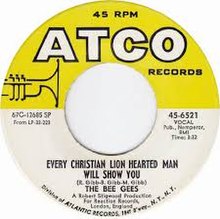
Maurice Ernest Gibb was a British musician and songwriter. He achieved worldwide fame as a member of the Bee Gees pop group. Although his elder brother Barry Gibb and twin brother Robin Gibb were the group's main lead singers, most of their albums included at least one or two songs featuring Maurice's lead vocals, including "Lay It on Me", "Country Woman" and "On Time". The Bee Gees are one of the most successful pop-rock groups of all time.

Cucumber Castle is the seventh studio album by the Bee Gees, released in April 1970. It was produced by Barry Gibb, Maurice Gibb, and Robert Stigwood. It consists of songs from their television special of the same name, which was named after a song on their 1967 album Bee Gees' 1st. Cucumber Castle is the only Bee Gees album not to feature any recorded contributions from Robin Gibb, as he had left the group before the album was recorded.

Best of Bee Gees is a 1969 compilation album by the English-Australian rock band Bee Gees. It was their first international greatest hits album. It featured their singles from 1966–1969 with the exception of the band's 1968 single "Jumbo".
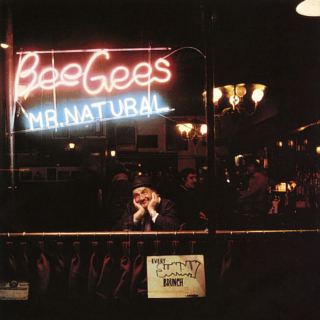
Mr. Natural is the twelfth studio album by the Bee Gees, released in 1974. It was the first Bee Gees release produced by Arif Mardin, who was partially responsible for launching the group's later major success with the follow-up album Main Course. The album's rhythm and blues, soul, funk, and hard rock sounds initiated the group's reinvention as a disco and blue-eyed soul act, which would solidify on subsequent albums. However, Barry Gibb has said that the album was "whiter" than Main Course. The cover photograph was taken at 334 West 4th Street, Greenwich Village, New York City by Frank Moscati, which is today known as The Corner Bistro tavern.
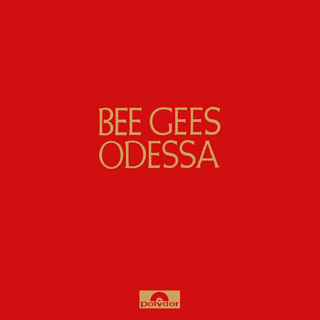
Odessa is the sixth studio album by the Bee Gees, a double vinyl LP released in February 1969, initially in an opulent red flocked cover with gold lettering. Despite reaching the UK Top Ten and the US Top 20, the album was not particularly well-received, though now is regarded by many as the most significant of the group's Sixties albums. An ambitious project, originally intended as a concept album on the loss of a fictional ship in 1899, it created tension and disagreements in the band regarding the work's direction; finally, a dispute over which song to release as a single led to Robin Gibb temporarily leaving the group.

Horizontal is the fourth studio album by the Bee Gees, and their second album to receive an international release. The LP was released in early 1968, and included the international hit singles "Massachusetts" and "World". On 5 February 2007, Reprise Records reissued Horizontal with both stereo and mono mixes on one disc and a bonus disc of unreleased songs, non-album tracks, and alternate takes. The album was released in Polydor in many countries and on Atco only in the US and Canada. "And the Sun Will Shine" was released as a single only in France. The influences displayed on the album range from the Beatles to baroque pop.

The Bee Gees Sing and Play 14 Barry Gibb Songs is the debut studio album by the Bee Gees. Credited to Barry Gibb and the Bee Gees, it was released in November 1965 on the Australian Leedon label. It is largely a compilation of most of the Gibb brothers' singles that had been released over the previous three years in Australia, which accounts for the many different styles of music on it.
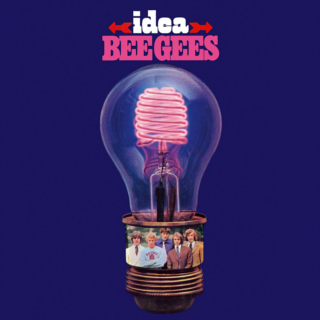
Idea is the fifth album by the Bee Gees. Released in August 1968, the album sold over a million copies worldwide. The album was issued in both mono and stereo pressings in the UK. The artwork on the Polydor release designed by Wolfgang Heilemann featured a "beehive" neon lightbulb with a group photo in its base, while the North American ATCO release designed by Klaus Voormann featured a composite head made from each band member. It was their third internationally released album – the first two albums being released only in the Australian market.
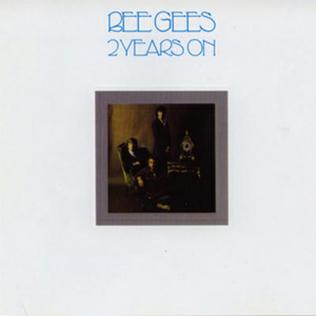
2 Years On is the eighth studio album by the Bee Gees, which reached No. 32 on the US charts. Released in 1970, the album saw the return of Robin Gibb to the group after an earlier disagreement and subsequent split following Odessa. 2 Years On was the first album with drummer Geoff Bridgford, who remained a full-time member of the group until 1972 although he was not pictured on the sleeve. The best-known track is "Lonely Days". Released as the first single by the reunited brothers, it charted high in the US, but only reached No. 33 in the United Kingdom.

To Whom It May Concern is the tenth album by the Bee Gees. Released in October 1972, it is the follow-up to, and continues the melancholic and personal sound of its predecessor, Trafalgar. The album was recognised as "a farewell to the old Bee Gees" as the album marked the end of an era for the group in several ways: it was their last album to be recorded solely at IBC Studios, in London, their last with conductor and arranger Bill Shepherd, who had guided them since 1967, and their last under their first contract with Robert Stigwood. Some of the songs were old ones finished or rewritten for the occasion.
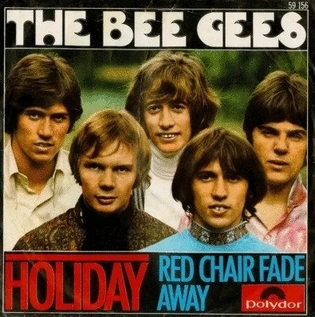
"Holiday" is a song released by the Bee Gees in the United States in September 1967. It appeared on the album Bee Gees' 1st. The song was not released as a single in their native United Kingdom because Polydor UK released the single "World" from their next album Horizontal.

"World" is a song by the Bee Gees, released in 1967 as a single in the United Kingdom and Europe and then included on their album Horizontal the following year. Though it was a big hit in Europe, Atco Records did not issue it as a single in the United States, having just issued a third single from Bee Gees' 1st, "Holiday".

"I.O.I.O." is a song by the Bee Gees, released on the album Cucumber Castle. It was written by Barry and Maurice Gibb. The song was released as a single in March 1970, and was also one of the highlights of the album. The single was a relative success mainly on European charts. Its music video is taken from the film Cucumber Castle.
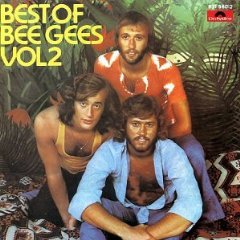
Best of Bee Gees Vol. 2 is a compilation album of hits by the Bee Gees released in 1973. The album, briefly revived on CD in the late 1980s, went out of print, but was reissued by Rhino in November 2008.

Bee Gees' 1st is the third studio album by the Bee Gees, and their first international full-length recording after two albums distributed only in Australia and New Zealand. Bee Gees' 1st was the group's debut album for the UK Polydor label, and for the US Atco label. Bee Gees 1st was released on 14 July 1967 in the UK. On 9 August it entered the UK charts; on that same day, the album was released in the US, and it entered the US charts on 26 August.

Here at Last... Bee Gees... Live is the first live album by the Bee Gees. It was recorded on December 20, 1976 at the LA Forum and was released in May 1977 by RSO Records. It reached No. 8 in the US, No. 8 in Australia, No. 1 in New Zealand, and No. 2 in Spain.

"Let There Be Love" is a dramatic ballad by the Bee Gees, written by Barry, Robin and Maurice Gibb and released as the opening track on their 1968 album Idea. In 1970, it was issued as a single in the Netherlands, peaking at no. 14 in March during a four-week chart run. In 1968, the group performed (lip-synced) the song on a European TV station, and the clip has been played on 192TV in the Netherlands.
"Black Diamond" is a song by the Bee Gees released on the album Odessa in 1969. The song was written by Barry, Robin & Maurice Gibb and featured lead vocals by Robin Gibb. It was included on the compilation Marley Purt Drive released in 1970.

New York Mining Disaster 1941 was released on Spin Records by the Bee Gees in 1967. It was their second EP and, like their first EP, was released only in Australia. All of the songs on this EP were originally released on their third LP Bee Gees' 1st.

"Timber!" is a song recorded by the Bee Gees, written by Barry Gibb. The song was released in Australia as their second single in July 1963, backed with "Take Hold of That Star". It was later included on the group's first album The Bee Gees Sing and Play 14 Barry Gibb Songs.
